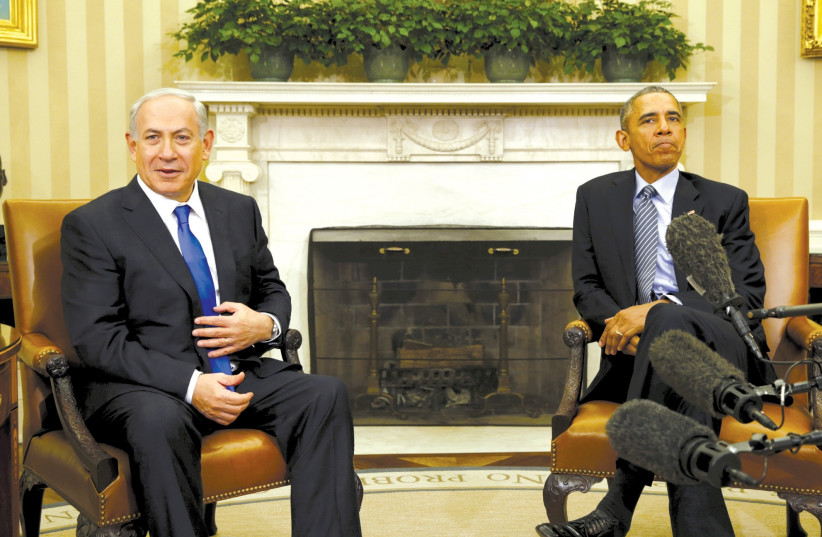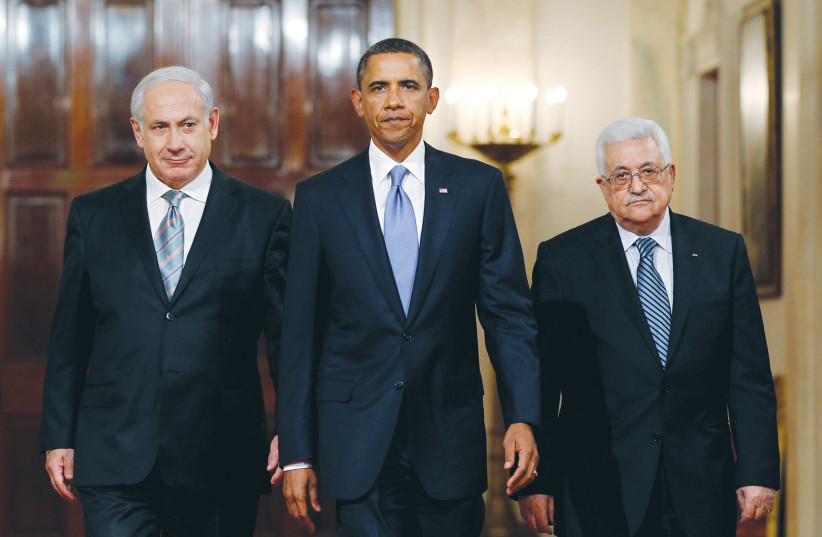The first time Netanyahu met Obama was in 2007 when the former was opposition leader and the latter was a freshman senator.

The Obama administration tried to “force confrontations” with Israel, former prime minister Benjamin Netanyahu accuses in his new book Bibi: My Story.
In their first meeting in the White House in 2009, US President Obama Obama threatened Netanyahu, the latter wrote.
As the meeting was about to end, Obama said: “You know, people often read me wrong, but I come from Chicago. I know how to deal with tough rivals.”
Then Netanyahu said that Obama did something else “that deeply shocked me because it was so opposed to his restrained character. The message was clear and it was meant to strike fear in me.”
Netanyahu does not say what Obama said or did to threaten him, but in a recently-published biography of the prime minister called Cracking the Netanyahu Code, journalist Mazal Mualem said that Obama gestured as though he was slitting someone’s throat while saying he knows how to deal with Netanyahu.

“Mr. President,” Netanyahu responded, “I am sure you meant what you said. But I am the prime minister of Israel and I will do all that I can to defend my country.”
The first time Netanyahu met Obama was in 2007 when the former was opposition leader and the latter was a freshman senator. Netanyahu thought that even though they had very different points of view – Obama “championed the social-democratic idea; I was an economic conservative and security hawk”- that they could work well together.
Netanyahu dismissed his first impression a paragraph later, calling it “wishful thinking,” and scoffing at Obama as someone who “saw the world through anti-colonialist glasses” but did not understand the historic facts of the Israel-Palestinian conflict in which “if there is any colonialism…it is Arab colonialism that began in the Muslim conquest of the Land of Israel, after which the land was emptied of most of its Jews.”
After Obama became president, Netanyahu wrote that he felt the tensions between them were beyond the usual pressure from US presidents over the Palestinian issue, but rather was “something much deeper, ideologically and personally.”
Netanyahu also expressed frustration at being unable to get the Obama administration on his side when it came to stopping the Iranian nuclear program.
Former Obama chief of staff Rahm Emanuel “tied America’s ability to stop Iran’s advancements in the nuclear area to our advances on the Palestinian track,” the former prime minister lamented. “The equation he made was clear as day: The US had no possibility to advance in stopping Iran without getting something in return for the Palestinians.”
During a 2010 White House visit, Obama gave Netanyahu and his staff “an assignment,” which the latter resented, saying that the president talked to them “like we were employees in his business or students in his class, not representatives of a sovereign state.” The assignment was to come up with concessions in Jerusalem that would renew talks with the Palestinians. After a few hours, Netanyahu walked out of the White House.
Ahead of Netanyahu’s visit to the White House the following year, the administration told him that Obama would be publicly calling for a “Palestinian state based on 1967 lines with land swaps.”
Netanyahu called then-secretary of state Hilary Clinton and asked: “Why are you forcing a confrontation?”
After Obama talked about 1967 lines in the Oval Office press gaggle at the end of that meeting, Netanyahu said: “It’s not going to happen” and spoke at length about Israel’s security challenges.
Netanyahu said that Obama’s then-chief of staff William Daley told his diplomatic adviser Ron Dermer: “Does your boss always lecture people hosting him in their office?”
“Only when they’re kicking our country in the face,” Dermer retorted.
Perhaps the best-known Obama-Netanyahu confrontation was when the prime minister spoke against the Iran nuclear deal before both houses of Congress at the invitation of Republican then-speaker of the House John Boehner, which the Obama administration opposed.
While Netanyahu writes about the tensions and drama before the speech, and of being warned by various members of Congress and friends in high places in the US that he should either back off the speech entirely or tread very cautiously, he writes almost nothing about the fallout.
Netanyahu implies that the fallout from the speech and damage bipartisan US support for Israel was a fiction cooked up by political rivals like now-prime minister Yair Lapid and critics in the Israeli media, citing concurrent polls about Americans’ support for Israel.
Conversely, Netanyahu portrays the effect of the speech as neutral to positive, saying that Senator Chuck Schumer, currently majority leader, told him that the speech moved six Democratic senators to support a bill requiring Congressional review of any deal lifting sanctions on Iran. He also quotes several US newspapers talking about the speech likely having a big impact.
Netanyahu, who hopes to return to the Prime Minister’s Office later this year, was very careful not to criticize current US President Joe Biden and portray him as a friend of Israel. In fact, he writes, that early in the Obama years, Biden, then the vice president, told Netanyahu that he doesn’t have many friends in the administration, but that Netanyahu can call him anytime.
In March 2010, the Jerusalem Municipality announced the construction of 1,600 homes in Ramat Shlomo, a neighborhood beyond the Green Line, during Biden’s visit to Israel.
Netanyahu said he was surprised by the announcement, and accused an unnamed Jerusalem City Council member from the Meretz Party of trying to sow conflict between him and the Obama administration.
Biden and Netanyahu worked together on their response; Netanyahu expressed regret for the timing of the announcement and said that this is just a preliminary step in the planning process. Then, Netanyahu wrote, they had a pleasant dinner, without mentioning that Biden came an hour and a half late. According to Netanyahu, Biden even thanked him for making the public statement and removing him from the middle of US-Israel tensions.
It was the rest of the Obama administration that escalated, Netanyahu said, recalling that Clinton told him the construction announcement was “a personal insult to the president.”
Netanyahu also provides plenty of Biden-isms, with various folksy statements and stories Biden told him.
For example, Biden advised Netanyahu: “There’s no sense dying on a small cross.”
Or when Netanyahu told Biden that for the US, stopping the Iranian nuclear threat is important, but for Israel it is an existential matter – a formulation that Lapid has adopted in the past year, as well – Biden told Netanyahu a joke: A chicken suggested to a pig that they give their farmer some bacon and eggs. The pig says to the chicken, “for you, that’s a one-time donation. For me, it’s a lifetime commitment.”
Bibi: My Story came out in Hebrew on Friday, and is set to be released in English on Tuesday. The quotes in this article are translated from the Hebrew version.
As reported by The Jerusalem Post
